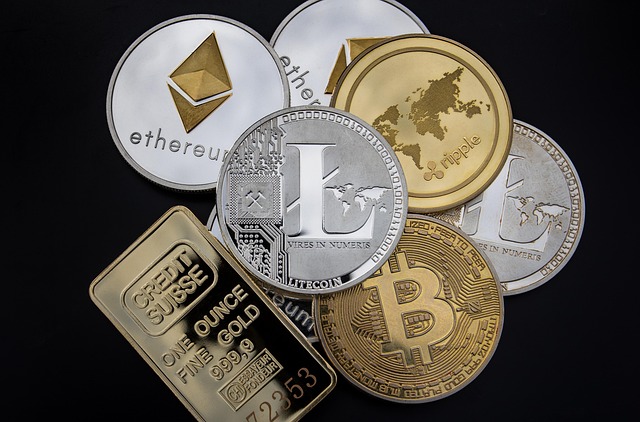The Ultimate Guide to Cryptocurrency Wallets
Author: Jameson Richman Expert
Published On: 2025-02-22
Prepared by Jameson Richman and our team of experts with over a decade of experience in cryptocurrency and digital asset analysis. Learn more about us.
With the rapid growth of the cryptocurrency industry, more and more people are exploring the world of digital currencies. Whether you’re a seasoned trader or a newcomer, one essential aspect of participating in the crypto ecosystem is having a reliable cryptocurrency wallet. This guide will dive deep into the various types of wallets, their security features, and best practices for managing your digital assets.

What is a Cryptocurrency Wallet?
A cryptocurrency wallet is a digital tool that allows users to store, send, and receive cryptocurrencies. Unlike a traditional wallet that holds physical currency, a crypto wallet stores your public and private keys, which are essential for conducting transactions on the blockchain. It's important to note that wallets do not actually store your coins; instead, they provide a means to interact with your assets stored on the blockchain.
Types of Cryptocurrency Wallets
There are several types of cryptocurrency wallets, each with its own set of features and security measures. The main types include:
1. Hardware Wallets
Hardware wallets are physical devices designed to securely store your private keys offline. They are one of the safest options for storing large amounts of cryptocurrency. Popular models include Trezor and Ledger. Using a hardware wallet significantly reduces the risk of hacks as they are not connected to the internet.
2. Software Wallets
Software wallets can be downloaded and installed on a computer or mobile device. They are generally easier to use than hardware wallets but are more susceptible to security risks. There are two main categories of software wallets:
- Desktop Wallets: Installed on personal computers, providing full control over your assets. Examples include Exodus and Electrum.
- Mobile Wallets: Apps designed for smartphones, offering convenience for transactions on the go. Examples include Trust Wallet and Coinomi.
3. Web Wallets
Web wallets are online services accessed via a web browser. While they offer convenience, they are more vulnerable to security breaches. Examples include Coinbase and Binance web wallets. The essential tip for using web wallets is to enable two-factor authentication (2FA) for added security.
4. Paper Wallets
A paper wallet is a physical document that contains your public and private keys, often in the form of QR codes. Although they are considered highly secure because they are offline, paper wallets can be easily lost or damaged. If you choose this option, make sure to print and store it safely.
Choosing the Right Wallet
When selecting a crypto wallet, consider factors such as:
- Security: The primary concern should be how well the wallet protects your private keys.
- Control: Look for wallets that allow you to control your private keys instead of relying on a third party.
- User Experience: Choose a wallet that offers an intuitive interface and customer support.
- Supported Cryptocurrencies: Ensure the wallet supports the specific currencies you plan to hold.

How to Set Up a Cryptocurrency Wallet
The process of setting up a cryptocurrency wallet varies depending on the type of wallet you choose. Here's a general overview:
For Hardware Wallets:
- Purchase a hardware wallet from a reputable source.
- Follow the manufacturer's instructions to initialize the device.
- Safeguard your recovery seed, as it can restore access to your wallet.
For Software Wallets:
- Download the wallet software from the official website or app store.
- Create an account and set a strong password.
- Backup your wallet by recording the recovery phrase provided.
For Web Wallets:
- Visit the official website of the web wallet provider.
- Sign up for an account and follow the necessary verification steps.
- Enable 2FA for enhanced security.
Best Practices for Wallet Security
Keeping your cryptocurrencies safe requires more than just picking a good wallet. Here are some best practices:
- Enable Two-Factor Authentication: Always use 2FA where possible to add an extra layer of security.
- Regular Backups: Make regular backups of your wallet and store them securely.
- Keep Software Up to Date: Ensure you are using the latest version of your wallet software to benefit from security patches.
- Beware of Phishing: Always double-check URLs and only download software from official sources to avoid scams.
- Cold Storage: For long-term storage, consider transferring your assets to a hardware wallet or a paper wallet.
Trading on Cryptocurrency Exchanges
Once you have your cryptocurrency wallet set up, you might want to start trading. Cryptocurrency exchanges allow users to buy, sell, and exchange different cryptocurrencies. Major exchanges include Binance and MEXC. When choosing an exchange, consider factors like fees, security, and available trading pairs.
If you’re looking to open an account with a reliable exchange, you can register on Binance here or on MEXC here.

Understanding Crypto Volume Signals
Understanding crypto volume signals is essential for traders aiming to predict price movements. Volume refers to the number of coins traded within a specific timeframe and can provide insights into market trends. For a detailed analysis of how to read volume signals, check out this comprehensive guide on Understanding Crypto Volume Signals.
The Future of Cryptocurrency Wallets
As the cryptocurrency landscape continues to evolve, so too will the technology behind wallets. Innovations such as multi-signature wallets, enhanced security protocols, and integrated decentralized finance (DeFi) features are emerging trends worth monitoring. Adapting to these changes will be crucial for both beginner and experienced cryptocurrency users.
Conclusion
Choosing the right cryptocurrency wallet is foundational to your trading and investment experience. By understanding the different types of wallets, their security features, and best practices, you can make informed decisions that align with your needs. Stay proactive about security, and always educate yourself on the latest developments in the crypto world. After all, with the right knowledge and tools, you can navigate the exciting yet volatile journey of cryptocurrency investments with confidence.
For further reading on managing your digital assets, check out this Ultimate Guide to Cryptocurrency Wallets.